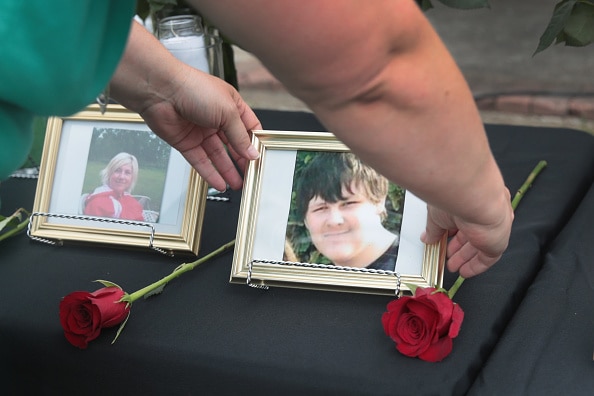Create a free profile to get unlimited access to exclusive videos, breaking news, sweepstakes, and more!
We Need To Stop Talking About Which Mass Shootings Are The 'Worst'
The news media’s fallback on the word “worst" is an invitation for the rest of us to stop caring.

The Santa Fe High School shooting in Texas last week, which left 10 people dead, was "the worst mass shooting in America since Valentine’s Day," as the Houston Chronicle put it.
On Valentine’s Day, of course, a gunman killed 17 people at a school in Parkland, Florida, in what was reported as "the worst school shooting in Florida history." That came just three months after a shooter killed 26 people in a Sutherland Springs, Texas church. It was the "worst mass shooting at a house of worship in American history." A month before that, a gunman in Las Vegas opened fire on a country music festival and killed 58 people in what was universally deemed “the worst mass shooting” in the nation’s history, no qualifiers needed. The Orlando nightclub attack that left 49 people dead had that title just one year before.
We're growing numb to the epidemic of mass shootings, and news coverage of these massacres plays a major part in that. On cable news and front pages across the country, the mass murder of random people is reported as routine, and there’s much about this coverage that needs to change. Those changes can start by a collective step away from just one word: “Worst.”
The sensationalism about which mass shootings are the “worst” is the media’s biggest tell that they are losing interest in the human toll of these attacks. It’s a single word that shows a world of apathy. The simple fact is that, for the people whose lives are shattered by random rampages, the “worst” mass shooting is the one that found them. It’s the one that killed their child or their friend, or left them paralyzed, or left them unharmed but unable to live a secure life again. That shooting is the worst they’ll ever know, and they don’t need CNN assuring the nation otherwise.
Consider the Isla Vista, California killings in 2014 that left six people dead, three of them from gunfire — a body count that would never be hyped today as the “worst” anything. Witness the incomprehensible grief of Richard Martinez, whose son Christopher was one of the victims, and who refused to hold back his rage for the cameras.
Are we to believe that, for him, the mass shootings since then are “worse” than the one that took his son? Are people who ran from gunfire at a Waffle House in Nashville or Umpqua Community College in Oregon supposed to take comfort in knowing that other people had it “worse”? Is the LGBT community supposed to accept that the Las Vegas shooting is “worse” than the one that targeted the clubs they consider safe spaces?
We don’t need to make this a competition or a spectacle. We don’t need to keep replacing our collective memories of one massacre with another. The media’s fallback on the word “worst,” the eagerness to shove that word into headlines for the latest attack, is an invitation for the rest of us to stop caring. It flattens and dehumanizes what happens in each of these shootings. We know what will happen when the news keeps telling everyone that things are just getting worse and worse. People either go into denial, or they tune out.
But what, you may ask, about the similar fixation on the media promoting the “deadliest” mass shootings? How is that better? The difference I see is that “deadliest,” while obviously a ranking, is also an objective fact. It’s not a cynical value judgment of one tragedy against all others. “Deadliest” is something people can keep track of. “Worst,” with enough repetition, is simply numbing. People can’t quantify or contextualize it, and so they don’t remember it.
We’re beyond the point of wondering whether coverage of mass shootings is leading to more mass shootings. It obviously is. The killers, of course, aren’t going to be affected much by whether they’re hearing about the “worst” or the “deadliest” shootings. They’ve lost any care for humanity in the first place, and their motive remains the same as always: To kill as many people as they can.
Ending the news media’s fixation on the “worst” mass shootings is not about influence on the killers. It’s about everyone else — the families that are destroyed, the communities that are scarred, the public that shouldn’t be losing its outrage. It’s about the media showing the public that they care about gun violence even when it doesn’t break a record or match a catchphrase. It’s about refusing to use one word as an easy way out of confronting the facts of what is happening.
Consider those facts for a moment. Ten people were killed in Santa Fe High School last Friday. One family lost their son the day before they were going to hold his 17th birthday party. Another lost their daughter who came from Pakistan to Texas as an exchange student. Three children and 11 grandchildren will grow up without their family’s caretaker because she happened to be substitute teaching that day. Do we need anything worse than this?
[Photo: Getty]






















